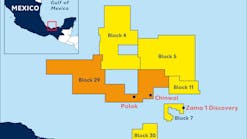M-I showed off its greenhouse, aimed at investigating bioremediation and technologies that convert drilled cuttings into soil-enhancement material, on April 4. The Houston facility went into the planning stages a couple of years ago, and the drilling and completion fluid products company began testing seed germination in the lead-up to the erection of the greenhouse. Scientists are growing plants in different mixes of soil and converted cuttings. M-I's current test starts off where a 1970s American Petroleum Institute test left off: with bean plants. Also taking residence in the new greenhouse are tomato plants, several flower varieties, and salt marsh grass, which is part of a wetlands study. The current flora will be replaced as needed. "For individual projects, we'll pick plants native to that habitat and restore it to the way we found it," said John Candler, manager of environmental affairs. A test for Louisiana soil might feature sugar cane, he said. And soil enhancements that would work well for the Houston area may not be suitable for an Arctic climate. "How do you know what is right for drilling in an arid desert area is right for drilling in a rain forest?" he said.
The greenhouse showcases M-I's focus on moving to recyclable material and productive material. "Industry leaders are going to focus on source reduction," he said, noting that more efficient drilling practices lead to less waste. "As we focus on the very front end, the operators are going to see some benefits in drilling these wells," Candler said.
M-I is 60% owned by Smith International and 40% owned by Schlumberger Ltd.




